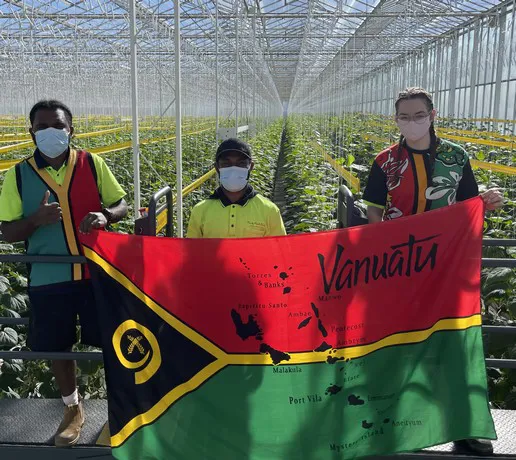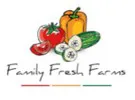When thinking about Australia, most people will picture koalas, kangaroos, and dangerous spiders – or, after reading yesterday’s interview with Nicky Mann, chair of the board of Protected Cropping Australia, of the opportunities there are for the horticultural industry. Yet, despite the many opportunities in the growing market, there are also a lot of challenges growers have to face. As a grower herself, she also shares how Family Fresh Farms is dealing with these challenges.

Water and sustainability
To start with, access to adequate and reliable water is a big challenge in Australia. “Water licenses, pumping licenses, and the quality of water are all hurdles that many growers need to face to even be able to grow their crops.” Furthermore, when building a new greenhouse, it has to meet many requirements. In fact, because greenhouses are treated as industry buildings, they have to meet many requirements that are not actually necessary, a process that works against many growers. Therefore, “the Protected Cropping Australia is trying to get the Greenhouse Construction Code recognized as a specialized building instead of them being treated like a factory.”
Growers all around the globe, also in Australia, are dealing with higher input costs. Especially during Covid, the shortages and delays in freight have been difficult for many growers and pushed costs up astronomically. “The smaller farming operations are not able to finance buying and storing extra supplies to tide them over until the shortages and delays caused by freight delays improve,” Nicky says. Then the rising costs of electricity, fuel, oil, fertilizers, chemicals, freight, etc. is putting a huge strain on many horticultural enterprises and their profit margins. “We are blessed with excellent radiation and moderate temperatures - so we do not feel the effects as much as our counterparts in the colder regions around the world. However, CO2 costs have gone nuts, and there is little choice for growers as there are only two main suppliers in Australia - BOC & Air Liquide. Growers going forward will definitely think of reaping CO2 off their heating systems or other alternative sources to get CO2. Many of the bigger enterprises are trying to avoid rising costs by using waste wood for boilers and heating or solar panels to generate or supplement their electricity supply.”
Also, Family Fresh Farms is aiming to put in more solar power and create more of their own electricity. “We use the Plant Empowerment principles in our business – introduced by our Dutch Head Grower Patrick de Craen - which is all about getting the plants to perform at their optimum using the least amount of input/energy resources. So, we are trying to keep a holistic approach to growing and production. Don't get me wrong - Family Fresh Farms aims to be the best in the world in everything we do and that includes production per square meter; but we need to look at all 4 P's of the bottom lines: profit, people, planet, and purpose,” she says.
Sustainability
She explains how these 4 P’s also come to mind when looking at the growing demand for sustainable products. “Growers are committed to doing the right thing, and going forward, in order to supply major supermarkets, growers will have to be compliant with sustainable packaging and practices throughout their business. There are programs/grants for companies to better deal with their waste. Most of the growers are already recycling and reusing water and nutrients in their systems. There is a lot more regulation around nutrient run-off, etc. after the disasters in the Great Barrier Reef in the past.” Yet, due to the small size of the glasshouse industry, it does not come easily. For example, there is no critical mass for the recycling of rockwool, and huge amounts of plastic used for tunnels are not recycled either. “Growers want to do the right thing and use bio-degradable twine, packaging, etc., but it seems that the consumer does not want to pay a little more so that the growers can do so. Australian councils and industries also seem unprepared for more sustainable ways of growing, and don’t have the recycling equipment or programs ready yet for our products.”
As for Family Fresh Farms itself, they have set their goal to reduce their plastic use and waste by 50% by 2025. “This is a much bigger goal than we anticipated, but we are taking steps and working towards doing this. It has opened our eyes to the programs available to assist our company do this and once we know how, we will share our learnings with the greater industry, as this is a national & worldwide issue that we are all responsible for.”
LaborThere is one topic that is even more urgent than all the ones previously mentioned. “Labor, I think, is an issue around the globe, but in Australia, this seems to be one of the most important challenges all growers face,” says Nicky. “To start with, getting a reliable workforce is a challenge, as is getting skilled employees. Especially managers and growers that have the technical ability and knowledge of agronomy, and are able to manage labor, budgets, and the business overall, are hard to find”
Therefore, to get the best people, companies are offering attractive salaries which can then put these skilled people out of reach for small and medium-size horticultural businesses. “We also have a huge shortage of experienced technicians to fix and repair the complex irrigation, boiler, climate, and packaging equipment - many businesses still rely on overseas technicians to service and troubleshoot the machinery used in the greenhouse industry in Australia.”
The situation worsened during the lockdown, when Australia shut the borders, meaning that backpackers and students who often work in greenhouses went home, and seasonal workers could not enter the country either. “We only had the teams that were already in the country before Covid-19 hit, and some of these teams also wanted to go home, so they were repatriated to countries like Vanuatu, Tonga, Fiji, and East Timor, which meant even fewer workers in the country. This has had an enormous effect on the glasshouse sector and horticultural sector at large in Australia. Some growers scaled back production so that their smaller teams could manage, some growers didn't plant as they had no harvesters to pick the crops, and some growers tried to maintain their crop scheduling and just paid the high penalty rates to keep the small teams working longer hours. In a nutshell, the costs of production increased for those that tried to keep operating at pre-Covid levels.”
Of course, Family Fresh Farms, too, felt the labor shortage. As some of the larger glasshouse companies in Australia, they paid for workers to come to Australia on charter flights and paid for their 2 weeks of quarantine. “We brought in 40 seasonal workers from Vanuatu, which allowed us to repatriate people who had been stuck in Australia for over 18 months, away from their families and communities. The new fresh workers were motivated and eager to earn some money to support their families back on the islands where the economy was decimated when tourism stopped due to Covid-19. We have also just started a new program to recruit and train university graduates."
“We train and encourage every member of our team to be the best in the world at what they do. By training and upskilling our team, we are able to achieve incredible results in the glasshouse which then reflects well for our investors. Making sure people are doing what they do best every day gets the work done and makes us super-efficient.”
With the high cost of labor, Family Fresh Farms utilizes the Priva FS Performance system to measure everything that everyone does. “We reward the fastest and best quality performing employees, and then get them to teach and train the slower employees. Measuring and looking at the numbers done by our entire team allows us to make informed decisions on the best use of our most expensive input.”
Sharing workers
Despite the situation being extremely difficult, there have been some silver linings. “We shared some of our seasonal workers with our neighbor over the winter (quieter) period, so there has been a lot more collaboration between growers in this difficult time.” Also, the agriculture industry in Australia has lobbied their government to introduce a brand-new Agricultural Visa. “This allows workers from select Asian countries to come to Australia on work visas to specifically work in agriculture and to assist our sector. This will be a huge help in the future, plus it will assist heavily populated Asian countries to allow some of their workers to earn excellent wages for what people often still see as 'low skilled work'".
Nicky adds that she completely disagrees with this notion that these horticultural workers are ‘unskilled'. “On the contrary: yes, it can be monotonous and repetitive, but many of the horticultural products need physical labor to plant, harvest, and maintain. To do these tasks well and efficiently, the laborer needs to be motivated and skilled to complete this work day-in and day-out.”
Moreover, Nicky adds, it is not all about hard work. “It's about working smarter and having loads of fun and enjoying what we do every day. We get that people spend a lot of their life at work - so we try to make it the best it can be. We also do after-work activities together like playing volleyball, soccer, basketball, snooker, and we are lucky to have an amazing gym on-site. We also have movie nights and entertainment nights to mix it up. Covid has been tough, as we have been in lock-down for nearly 4 months, and we have not been able to get out as much as we like, but we are all safe and doubly vaccinated for when life returns to normal. We have been blessed with an amazing team of talented people throughout our business and we’ve managed to keep operating our business when others have not been so fortunate.”
For more information:
Family Fresh Farms
www.familyfreshfarms.com.au
